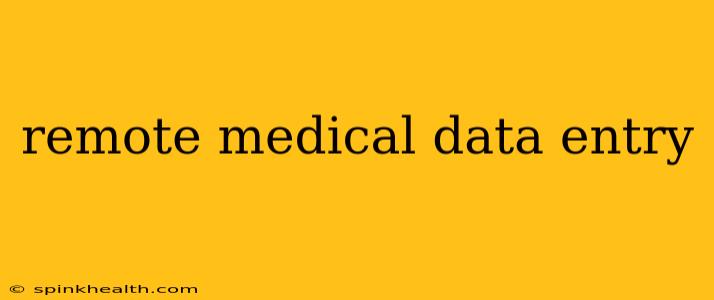The world of healthcare is rapidly evolving, with technology playing an increasingly crucial role. One area experiencing significant growth is remote medical data entry. This isn't just about typing up doctor's notes; it's a complex field requiring accuracy, confidentiality, and a deep understanding of medical terminology. This comprehensive guide will delve into the intricacies of remote medical data entry, addressing common questions and concerns.
Imagine this: You're a skilled medical coder, comfortable working from the quiet comfort of your home, contributing to accurate patient records across the country. That’s the reality for many remote medical data entry specialists. But it's not as simple as it sounds. There are specific skills, certifications, and compliance requirements to consider. Let’s unpack it all.
What is Remote Medical Data Entry?
Remote medical data entry involves inputting patient medical information into electronic health records (EHRs) or other healthcare databases from a remote location. This data can include anything from patient demographics and medical history to test results, diagnoses, and treatment plans. The work often requires a keen eye for detail, strong typing skills, and a solid understanding of medical terminology and coding systems like ICD-10 and CPT.
What are the qualifications for remote medical data entry jobs?
This is a key question, and the answer isn't one-size-fits-all. While some roles might only require basic data entry skills and familiarity with medical terminology, others demand certified medical coders with years of experience. Many employers prefer candidates with:
- Strong typing skills and accuracy: Speed is important, but accuracy is paramount in healthcare.
- Knowledge of medical terminology and abbreviations: Understanding medical jargon is essential for accurate data entry.
- Familiarity with EHR systems: Experience with popular EHR software is a significant advantage.
- Excellent attention to detail: Errors can have serious consequences in healthcare.
- Commitment to confidentiality and HIPAA compliance: Protecting patient privacy is paramount.
- Reliable internet connection: Consistent connectivity is crucial for remote work.
What software is used for remote medical data entry?
The software used varies depending on the specific healthcare provider or company. Common EHR systems include Epic, Cerner, Meditech, and Allscripts. Each system has its own interface and workflow, so familiarity with these platforms is highly beneficial. Beyond EHRs, you might also encounter specialized software for medical billing, claims processing, or other healthcare-related tasks.
What are the benefits of remote medical data entry?
The advantages are many, especially for the worker. These jobs offer:
- Flexibility: Set your own hours and work from anywhere with a reliable internet connection.
- Work-life balance: Better manage personal commitments alongside your professional life.
- Career growth: Opportunities for advancement exist within the field.
- Demand: The need for remote medical data entry professionals is constantly growing.
How to find remote medical data entry jobs?
Numerous avenues exist for finding these opportunities. Online job boards like Indeed, LinkedIn, and Monster often list remote medical data entry positions. You can also directly contact healthcare providers, medical billing companies, and transcription services to inquire about open roles. Networking within the healthcare industry can also lead to promising opportunities.
What is the average salary for remote medical data entry jobs?
Salaries vary widely depending on location, experience, certifications, and the specific employer. While entry-level positions might offer a lower hourly rate, experienced medical coders with specialized skills can command significantly higher salaries. Researching salary ranges in your area and considering factors like experience and certification is crucial when negotiating compensation.
Is remote medical data entry a good career path?
If you're detail-oriented, comfortable working independently, and interested in the healthcare industry, remote medical data entry could be an excellent career path. The growing demand for these services ensures job security, and the flexibility offered by remote work provides a compelling work-life balance. However, the responsibilities are significant, demanding accuracy and adherence to strict confidentiality guidelines.
Conclusion
Remote medical data entry offers a fulfilling career path for those possessing the necessary skills and dedication. By understanding the requirements, embracing continuous learning, and maintaining a commitment to accuracy and confidentiality, you can thrive in this ever-evolving field. Remember to research thoroughly, network effectively, and prioritize your professional development to ensure a successful and rewarding career in remote medical data entry.

